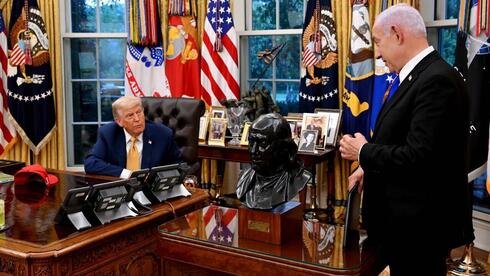The unannounced Oval Office meeting—Netanyahu’s fourth with Trump in six months—centered almost exclusively on Gaza. “We’ve got to solve that. Gaza is a tragedy,” Trump said ahead of the talks. “He wants to get it solved. I want to get it solved. I think the other side wants to solve it too.” Sources reported that Trump applied “maximum pressure” on Netanyahu regarding efforts to reach a ceasefire in Gaza.
Netanyahu arrived without public notice and left the White House after about 90 minutes without making a joint statement. U.S. Vice President J.D. Vance also attended the meeting and later held a brief follow-up with the Israeli leader.
“We focused on all efforts to secure the release of our abductees,” Netanyahu said afterward. “We will not stop—not even for a moment—and this is possible because of the military pressure applied by our brave soldiers. Tragically, this effort comes at a painful cost, with the fall of our best sons.”
Israel continues to press for the return of hostages taken by Hamas during the October 7 cross-border assault, which sparked the ongoing conflict. Netanyahu said Israel remained committed to its three war aims: releasing all hostages, dismantling Hamas’s military and governing capabilities, and ensuring Gaza will no longer pose a threat to Israeli civilians.
The meeting comes as indirect negotiations mediated by Qatar are nearing a potential breakthrough. According to Israeli and American officials, only one major disagreement remains between Israel and Hamas. The sides are discussing a 60-day ceasefire deal that would include the release of 10 living hostages in two phases, the return of 18 bodies of slain hostages, the release of Palestinian terrorists from Israeli jails, and expanded humanitarian aid to Gaza. Trump would serve as a guarantor for follow-up negotiations.
The primary sticking point involves Israel’s plan to retain control over a narrow stretch of land in southern Gaza known as the Morag Corridor, a military route running just south of the Khan Younis and adjacent to the Egyptian border. Netanyahu has referred to this area as “Philadelphia 2,” a reference to the original Philadelphia Corridor, a buffer zone once maintained by Israel along the Egypt-Gaza border to prevent weapons smuggling.
Under the current plan, Israel would maintain a military presence in the Morag Corridor even after a ceasefire. Netanyahu argues that doing so is essential to blocking Hamas from rebuilding its arsenal through tunnels or cross-border smuggling. However, the proposal has sparked internal debate within Israel’s defense establishment, with some officials warning that holding the corridor could delay a hostage deal and might not be strategically necessary.
In tandem with the corridor plan, Israeli officials have announced their intention to establish a “humanitarian city” on the ruins of Rafah to house displaced civilians while separating them from Hamas fighters. Israeli officials say control of the Morag Corridor is critical to keeping that zone secure.
Trump has increased pressure on Israel to finalize a deal. Two sources familiar with the negotiations told the United Kingdom’s Sky News that U.S. pressure on Netanyahu is expected to intensify. “The American pressure has started, and tonight it will be heavy,” one U.S. source told the outlet. Bishara Bahbah, a Palestinian-American businessman who has acted as a backchannel mediator between Washington and Hamas, reportedly relayed a message from Trump to the terror group stating that fighting would not resume after the 60-day truce.
The families met with members of Witkoff’s team and expressed cautious optimism. “There are clearly more opportunities on this trip,” said Rotem Cooper, son of slain hostage Amiram Cooper. “We are encouraged by the commitment that President Trump and his team are showing. It is clear to everyone that without ending the war, you cannot release them.”
In their first meeting Monday night, Netanyahu and Trump shared a two-hour dinner alongside senior aides, including U.S. Secretary of State Marco Rubio and U.S. Secretary of Defense Pete Hegseth. During the meal, Trump was asked whether his plan to allow Gazans to voluntarily emigrate from the enclave—first floated in February—remained in effect.
Netanyahu replied, “President Trump had a brilliant vision. He called it ‘free choice.’ If people want to stay, they can. But if they want to leave—they should be allowed to. It shouldn’t be a prison. It should be an open place where people have freedom of choice.”
Israeli officials say a deal could still come together by the end of the week but emphasize that the discussions remain sensitive.




